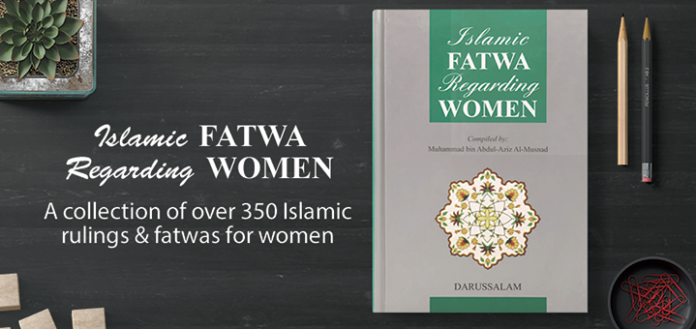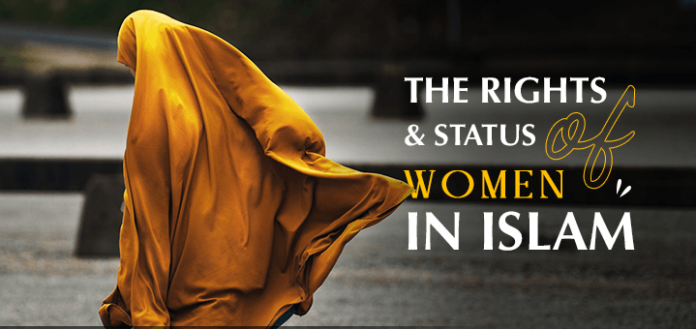Islam has given utmost The Rights and Status of Women in Islam. All of their rights have been safeguarded in contrast to the common misconception of women’s oppression. Women have been given their due right in regards to all of their roles whether it may be as a daughter, a wife, or a mother.
Here we will take a look at some of the prerogatives that have been granted to women with evidence of the Quran and Sunnah.
Read Our Blog on: Islamic Fatwa Regarding Women

Rights and Status of a Mother:
No doubt Islam has given a woman an esteemed status as a mother. As a mother, she has the right to receive respect and good treatment from her children in the same way a father deserves so.
Abu Huraira reported that a person said:
Allah’s Messenger, who amongst the people is most deserving of my good treatment? He said: Your mother, again your mother, again your mother, then your father, then your nearest relatives according to the order (of nearness).
(Sahih Muslim 2548b)
Similarly, in the Quran, Allah mentions how parents should be treated. This verse applies to both mothers and fathers equally showing that mothers have the same position as fathers if not more.
وَقَضَىٰ رَبُّكَ أَلَّا تَعْبُدُوا إِلَّا إِيَّاهُ وَبِالْوَالِدَيْنِ إِحْسَانًا ۚ إِمَّا يَبْلُغَنَّ عِندَكَ الْكِبَرَ أَحَدُهُمَا أَوْ كِلَاهُمَا فَلَا تَقُل لَّهُمَا أُفٍّ وَلَا تَنْهَرْهُمَا وَقُل لَّهُمَا قَوْلًا كَرِيمًا – 17:23
And your Lord has decreed that you not worship except Him, and to parents, good treatment. Whether one or both of them reach old age [while] with you, say not to them [so much as], “uff,” and do not repel them but speak to them a noble word.
In addition to good treatment by her children, some other rights of mothers are that she is entitled to receive her son’s financial support including payment of a debt as well as the right of custody over her child in case of a divorce.
Rights and Status of a Daughter
 In the past and to some extent even today girls and daughters are looked down upon by society and parents themselves. They are considered a burden and are labeled as inferior to sons. Islam, however, makes it clear that in the eyes of Allah that is not the case.
In the past and to some extent even today girls and daughters are looked down upon by society and parents themselves. They are considered a burden and are labeled as inferior to sons. Islam, however, makes it clear that in the eyes of Allah that is not the case.
The Prophet (ﷺ) said: If anyone has a female child and does not bury her alive, or slight her, or prefer his children (i.e. the male ones) to her, Allah will bring him into Paradise. Uthman did not mention “male children”.
(Sunan Abi Dawud 5146)
In Islam, parents are to treat all children equally without any discrimination.
“Fear Allah and treat your children fairly.”
(al-Bukhaari, 2447; Muslim, 1623)
Similarly, Allah ensures the daughter’s right in her parent’s inheritance. In case she is the only child she is entitled to half of the share and in case of multiple daughters (and no son), the share will be one-third. Whereas in a situation where the parents also have sons then the daughter’s share would be of half of her brothers. (Al Nisa 4:11)
Additionally, just like sons, the daughter has right over her parents in regards to her basic needs, father’s spending, good education, and more.
Rights and Status of a Wife
 Islam has also given the wife rights over her husband just as a husband has them over his wife.
Islam has also given the wife rights over her husband just as a husband has them over his wife.
“And they (women) have rights similar (to those of their husbands) over them to what is reasonable, but men have a degree (of responsibility) over them. And Allaah is All-Mighty, All-Wise”
[al-Baqarah 2:228]
The most basic right is to receive her husband’s kind treatment and love. The husband is not to be harsh towards his wife.
“The best of you is the one who is best to his wife, and I am the best of you to my wives.”
(al-Tirmidhi, 3895)
The holy prophet (PBUH) is a perfect example of how a husband should treat his wife.
In terms of finances, the husband is liable to spend on his wife and fulfill her basic needs i.e. provide her with accommodation, food, and clothes. In addition at the time of a marriage, a Mahar is determined between the two parties which the husband is obliged to pay to his wife.
“And give to the women (whom you marry) their Mahr (obligatory bridal-money given by the husband to his wife at the time of marriage) with a good heart”
[al-Nisaa’ 4:4]
This just provides a cursory picture of the rights and status of women in Islam. There are extensive resources available for detailed information on the rights of women in each role. However, this article hopefully clears a common misconception of women’s oppression in Islam. Practical examples of the rights and duties of women can be seen from the great women of Islam. Once such example is of Sayyida Khadijah (RA).
Read The Blog On: The Golden Stories Of The Sayyidah Khadijah (RA)

Let’s make a commitment to safeguarding the rights of women that have been granted to them by Allah Almighty himself.
































Nice